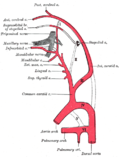Carotid body
Carotid Body
The carotid body is a small cluster of chemoreceptors and supporting cells located near the fork (bifurcation) of the carotid artery (which takes oxygenated blood from the heart to the brain). The carotid body detects changes in the composition of arterial blood flowing through it, mainly the partial pressure of oxygen, but also of carbon dioxide. The carotid body is one of the peripheral chemoreceptors of the respiratory system, assisting in the regulation of respiration.
Structure[edit]
The carotid body is located in the neck on either side of the trachea, and is approximately 2 mm in size. It is located at the bifurcation of the common carotid artery, between the internal carotid artery and the external carotid artery. The carotid body is composed of clusters of cells known as glomus cells, which are connected by a thin connective tissue. These cells are surrounded by a dense network of capillaries and nerve endings.
Function[edit]
The primary function of the carotid body is to monitor the levels of oxygen and carbon dioxide in the blood. When oxygen levels are low (hypoxia), or carbon dioxide levels are high (hypercapnia), the carotid body sends signals to the respiratory center in the brainstem, which in turn increases the rate and depth of breathing. This response is a key component of the body's homeostatic control of its blood gases.
Clinical significance[edit]
Dysfunction of the carotid body can lead to conditions such as sleep apnea, hypertension, and heart failure. In addition, tumors of the carotid body, although rare, can occur. These are typically benign and slow-growing, but can cause symptoms such as difficulty swallowing, hoarseness, and a pulsating mass in the neck.
See also[edit]
-
Diagram of the carotid body
-
Anatomy of the carotid artery
-
Carotid body tumor
Ad. Transform your life with W8MD's Budget GLP-1 injections from $49.99


W8MD offers a medical weight loss program to lose weight in Philadelphia. Our physician-supervised medical weight loss provides:
- Weight loss injections in NYC (generic and brand names):
- Zepbound / Mounjaro, Wegovy / Ozempic, Saxenda
- Most insurances accepted or discounted self-pay rates. We will obtain insurance prior authorizations if needed.
- Generic GLP1 weight loss injections from $49.99 for the starting dose of Semaglutide and $65.00 for Tirzepatide.
- Also offer prescription weight loss medications including Phentermine, Qsymia, Diethylpropion, Contrave etc.
NYC weight loss doctor appointmentsNYC weight loss doctor appointments
Start your NYC weight loss journey today at our NYC medical weight loss and Philadelphia medical weight loss clinics.
- Call 718-946-5500 to lose weight in NYC or for medical weight loss in Philadelphia 215-676-2334.
- Tags:NYC medical weight loss, Philadelphia lose weight Zepbound NYC, Budget GLP1 weight loss injections, Wegovy Philadelphia, Wegovy NYC, Philadelphia medical weight loss, Brookly weight loss and Wegovy NYC
|
WikiMD's Wellness Encyclopedia |
| Let Food Be Thy Medicine Medicine Thy Food - Hippocrates |
Medical Disclaimer: WikiMD is not a substitute for professional medical advice. The information on WikiMD is provided as an information resource only, may be incorrect, outdated or misleading, and is not to be used or relied on for any diagnostic or treatment purposes. Please consult your health care provider before making any healthcare decisions or for guidance about a specific medical condition. WikiMD expressly disclaims responsibility, and shall have no liability, for any damages, loss, injury, or liability whatsoever suffered as a result of your reliance on the information contained in this site. By visiting this site you agree to the foregoing terms and conditions, which may from time to time be changed or supplemented by WikiMD. If you do not agree to the foregoing terms and conditions, you should not enter or use this site. See full disclaimer.
Credits:Most images are courtesy of Wikimedia commons, and templates, categories Wikipedia, licensed under CC BY SA or similar.
Translate this page: - East Asian
中文,
日本,
한국어,
South Asian
हिन्दी,
தமிழ்,
తెలుగు,
Urdu,
ಕನ್ನಡ,
Southeast Asian
Indonesian,
Vietnamese,
Thai,
မြန်မာဘာသာ,
বাংলা
European
español,
Deutsch,
français,
Greek,
português do Brasil,
polski,
română,
русский,
Nederlands,
norsk,
svenska,
suomi,
Italian
Middle Eastern & African
عربى,
Turkish,
Persian,
Hebrew,
Afrikaans,
isiZulu,
Kiswahili,
Other
Bulgarian,
Hungarian,
Czech,
Swedish,
മലയാളം,
मराठी,
ਪੰਜਾਬੀ,
ગુજરાતી,
Portuguese,
Ukrainian



